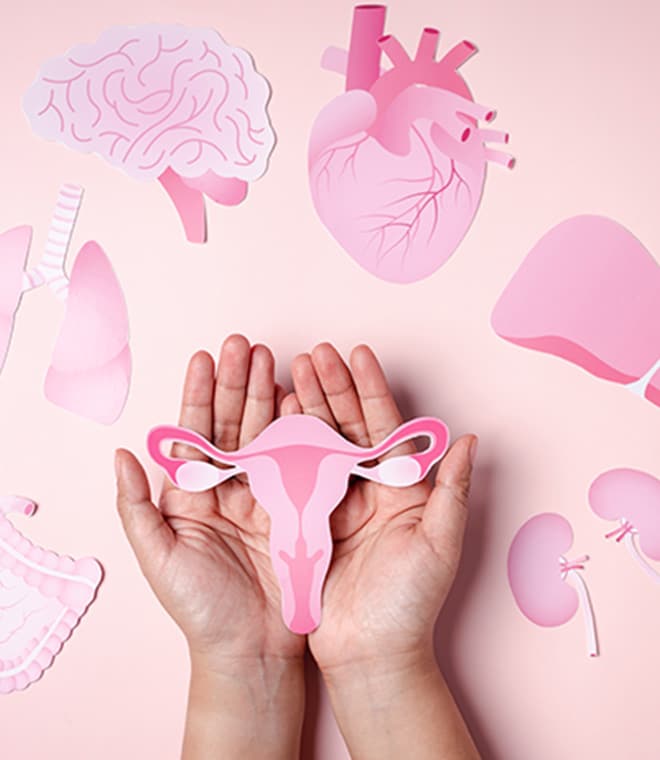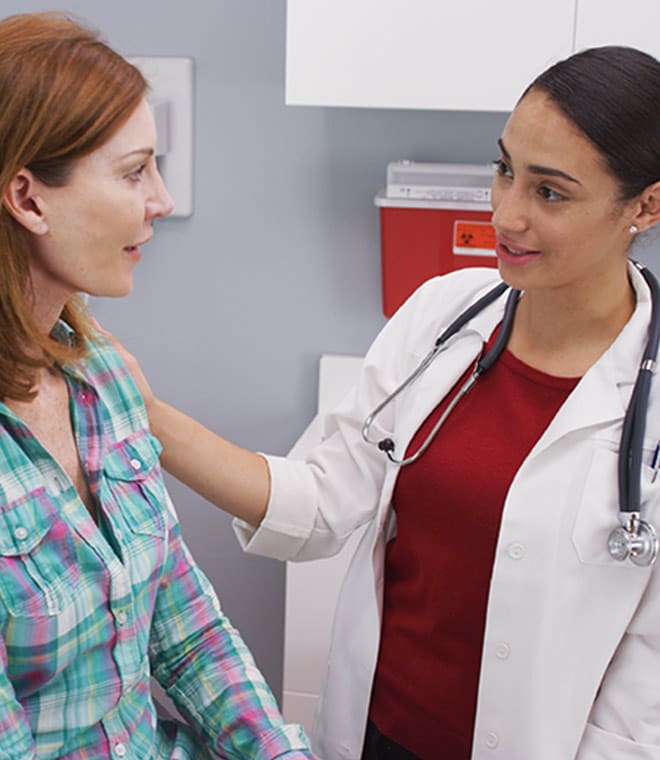Health
Menopause: What to expect
By Patricia Ann Convery, MD, Fellow, American College of Obstetrics and Gynecology Feb 19, 2025 • 6 min
Menopause is when a woman ceases to have periods and transitions out of childbearing years. It's a natural part of life that brings with it significant changes, though each woman’s experience is different. Knowing what to expect before, during and after menopause can prepare you for each stage and help you determine when you should see your healthcare provider for support.
When does menopause begin?
In the U.S., the average age a woman reaches menopause is 52. However, menopause can start anywhere from your 40s to your late 50s. A woman is considered to be in menopause once she has gone a full year without a menstrual period.
Perimenopause: What happens before menopause?
Perimenopause is when your body begins to transition to menopause. Some women remain in perimenopause for years, while others experience symptoms for only a few months. Common signs of perimenopause include:
- Changes in sleep patterns, such as insomnia
- Chills
- Dry skin
- Hot flashes
- Irregular periods
- Mood swings
- Night sweats
- Reduction of breast fullness
- Thinning hair
- Vaginal dryness
- Weight gain
Women usually won't experience all of these symptoms, and they may come and go throughout perimenopause. The symptoms of perimenopause usually decline after menstruation stops, but in some cases, women may experience some lingering signs for 10 years or more.
The effects of menopause
During menopause, estrogen levels fall significantly as ovulation stops. These hormonal changes affect many aspects of life and parts of the body after menopause, a time known as postmenopause.
Urinary system
Lower estrogen levels can weaken the pelvic floor muscles and cause other changes in the urinary tract. For some women, this leads to stress incontinence, urine leakage that occurs when you sneeze, laugh, cough or exercise. To manage stress incontinence, healthcare professionals may recommend exercises to strengthen the muscles that support the bladder. There are also treatment options and surgical procedures that can address symptoms of incontinence. Wearing incontinence pads and liners can help you feel drier and fresher.
In addition, menopause can put you at an increased risk for urinary tract infections (UTIs). Drinking plenty of fluids, urinating after sex and avoiding products that irritate the skin may lower the likelihood of developing infections.
Sexual health
Reductions in estrogen levels decrease the production of the body's natural lubricant, which may lead to vaginal dryness. Some women experience itching and soreness. Even those without other symptoms may feel uncomfortable during sexual intercourse. Using vaginal moisturizers and sexual lubricants may ease discomfort. If nonhormonal interventions are ineffective, your provider may offer you topical vaginal estrogen to restore the health of your vagina.
Menopause can also impact sex drive. For some, this means a declining interest in sex, while others become more interested once the risk of pregnancy is gone.
Mood and cognitive health
Although science has yet to uncover why, mood changes often accompany menopause. You may feel more irritable or depressed. Some women also experience difficulty with concentrating or describe feelings of brain fog due to menopause. Stress may worsen both of these emotional and cognitive effects, making stress management an important part of self-care.
Changes in body shape
Menopause sometimes leads to fat redistribution. Even if women don't gain any weight, they may develop fuller waists and bellies. Because metabolism often slows down after menopause, losing weight may become more difficult. However, weight management is possible with a healthy diet and regular exercise.
Muscles, joints and bones
Some women experience new aches and pains in their muscles and joints due to menopause. Lower estrogen levels may also lead to reduced bone density, increasing the risk of osteoporosis, a condition marked by brittleness of the bones due to the presence of tiny holes. Medical providers may recommend regular bone density testing to monitor for early signs of osteoporosis. In addition, they may recommend calcium and vitamin D supplements to support bone health.
Cardiovascular system
Menopause-related hormonal changes increase the risk of heart disease, heart attack and stroke in women. As a result, following a healthy diet, exercising regularly and managing other risk factors for cardiovascular problems like high blood pressure and high cholesterol are important during and after menopause.
If you experience symptoms of menopause that interfere with your physical, mental, sexual or emotional well-being, talk to your healthcare provider. Lifestyle interventions and treatments like hormone replacement therapy (HRT) may help alleviate symptoms. Regular preventive care is also essential throughout and following menopause. Ask your provider how often you should come in for checkups. There are also a number of over-the-counter menopause products available, which may be helpful.
Updated by Julie McDaniel, MSN, RN, CRNI, February 2025.
Sources:
- https://womenshealth.gov/menopause/menopause-basics
- https://medlineplus.gov/menopause.html
- https://www.nia.nih.gov/health/what-menopause
- https://www.mayoclinic.org/diseases-conditions/menopause/symptoms-causes/syc-20353397
- https://jamanetwork.com/journals/jamainternalmedicine/fullarticle/2819818
- https://www.mayoclinic.org/diseases-conditions/perimenopause/symptoms-causes/syc-20354666
- https://www.ncbi.nlm.nih.gov/pmc/articles/PMC6629580/
- https://www.uptodate.com/contents/genitourinary-syndrome-of-menopause-vulvovaginal-atrophy-treatment
- https://www.womenshealth.gov/a-z-topics/urinary-incontinence
- https://www.womenshealth.gov/menopause/menopause-symptoms-and-relief
- https://www.womenshealth.gov/menopause/menopause-treatment
- https://www.merckmanuals.com/professional/gynecology-and-obstetrics/menopause/menopause
- https://nationaleczema.org/blog/menopause-and-eczema/
- https://medlineplus.gov/ency/article/003999.htm
- https://pmc.ncbi.nlm.nih.gov/articles/PMC10669803/
- https://magazine.medlineplus.gov/article/menopause-what-you-need-to-know
- https://womenshealth.gov/menopause/menopause-and-sexuality
- https://www.uptodate.com/contents/osteoporosis-prevention-and-treatment-beyond-the-basics/print
- https://newsroom.heart.org/news/hot-news-flash-menopause-can-impact-a-womans-heart-health
- https://www.cdc.gov/heart-disease/prevention/index.html




